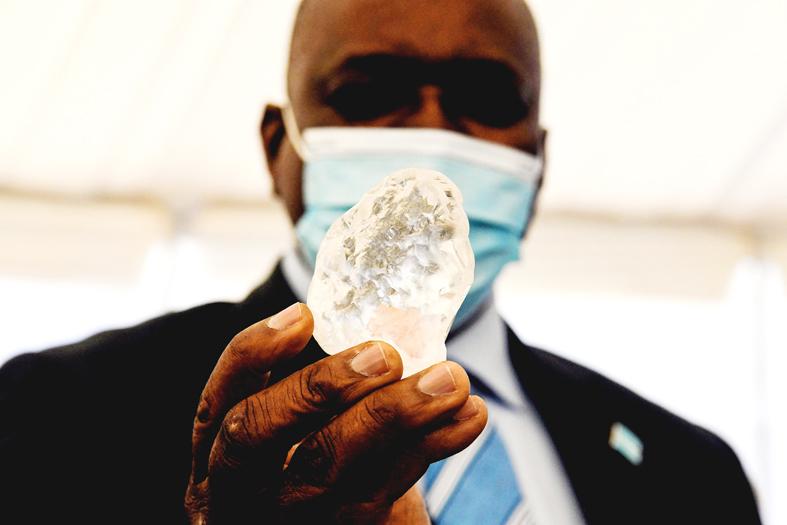A 1,098-carat diamond believed to be the third-largest gem-quality stone ever to be mined, has been discovered in Botswana, a joint venture between diamond company De Beers and the Botswanan government said.
The stone was on Wednesday presented to Botswanan President Mokgweetsi Masisi by Debswana Diamond acting managing director Lynette Armstrong.
It is the third-largest diamond in the world, behind the 3,106-carat Cullinan stone recovered in South Africa in 1905 and the 1,109-carat Lesedi La Rona unearthed by Lucara Diamonds in Botswana in 2015.

Photo: AFP
“This is the largest diamond to be recovered by Debswana in its history of more than 50 years in operation,” Armstrong said.
“Based on our preliminary analysis, it could be the world’s third-largest gem-quality stone,” she said. “We are yet to make a decision on whether to sell it through the De Beers channel or through the state-owned Okavango Diamond Co.”
Botswanan Minister of Mineral Resources, Green Technology and Energy Security Lefoko Moagi said the discovery of the yet-to-be-named stone — which measures 73mm long, 52mm wide and 27mm thick — could not have come at a better time after diamond sales were hit by the COVID-19 pandemic over the past year.
The government receives as much as 80 percent of the income from Debswana’s sales through dividends, royalties and taxes.
Production at Debswana fell 29 percent in the past year to 16.6 million carats, while sales fell 30 percent to US$2.1 billion, as the pandemic affected production and demand.
This year, Debswana plans to increase output by as much as 38 percent to a pre-pandemic level of 23 million carats, as the global diamond market recovers with the easing of travel restrictions and reopening of jewelers.

The Burmese junta has said that detained former leader Aung San Suu Kyi is “in good health,” a day after her son said he has received little information about the 80-year-old’s condition and fears she could die without him knowing. In an interview in Tokyo earlier this week, Kim Aris said he had not heard from his mother in years and believes she is being held incommunicado in the capital, Naypyidaw. Aung San Suu Kyi, a Nobel Peace Prize laureate, was detained after a 2021 military coup that ousted her elected civilian government and sparked a civil war. She is serving a

China yesterday held a low-key memorial ceremony for the 1937 Nanjing Massacre, with Chinese President Xi Jinping (習近平) not attending, despite a diplomatic crisis between Beijing and Tokyo over Taiwan. Beijing has raged at Tokyo since Japanese Prime Minister Sanae Takaichi last month said that a hypothetical Chinese attack on Taiwan could trigger a military response from Japan. China and Japan have long sparred over their painful history. China consistently reminds its people of the 1937 Nanjing Massacre, in which it says Japanese troops killed 300,000 people in what was then its capital. A post-World War II Allied tribunal put the death toll

‘NO AMNESTY’: Tens of thousands of people joined the rally against a bill that would slash the former president’s prison term; President Lula has said he would veto the bill Tens of thousands of Brazilians on Sunday demonstrated against a bill that advanced in Congress this week that would reduce the time former president Jair Bolsonaro spends behind bars following his sentence of more than 27 years for attempting a coup. Protests took place in the capital, Brasilia, and in other major cities across the nation, including Sao Paulo, Florianopolis, Salvador and Recife. On Copacabana’s boardwalk in Rio de Janeiro, crowds composed of left-wing voters chanted “No amnesty” and “Out with Hugo Motta,” a reference to the speaker of the lower house, which approved the bill on Wednesday last week. It is

FALLEN: The nine soldiers who were killed while carrying out combat and engineering tasks in Russia were given the title of Hero of the Democratic People’s Republic of Korea North Korean leader Kim Jong-un attended a welcoming ceremony for an army engineering unit that had returned home after carrying out duties in Russia, North Korean state media KCNA reported on Saturday. In a speech carried by KCNA, Kim praised officers and soldiers of the 528th Regiment of Engineers of the Korean People’s Army (KPA) for “heroic” conduct and “mass heroism” in fulfilling orders issued by the ruling Workers’ Party of Korea during a 120-day overseas deployment. Video footage released by North Korea showed uniformed soldiers disembarking from an aircraft, Kim hugging a soldier seated in a wheelchair, and soldiers and officials